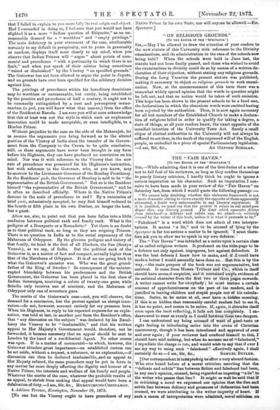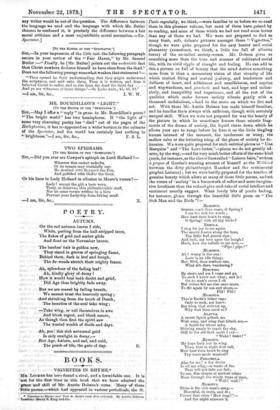THE "FAIR HAVEN."
[TO TRH EDITOR OF THB " SPEATATOR.1
SIR,—While admitting that it is one of the first duties of a writer- not to fall foul of his reviewers, so long as they confine themselves. to purely literary criticism, I hardly think he ought to ignore a serious imputation on his character. Such an imputation I con- ceive to have been made in your review of the "Fair Haven" on
Saturday last, from which I would quote the following passage :—
" We cannot help doubting whether this elaborate framework is not. a mere dramatic setting to views exactly the opposite of, those a.ppareutly advocated, a doubt very unfavourable to any literary enjoyment. If it is justified, we must say that the protest it raises in our mind goes deeper than any literary ground. The ,limit which separates fiction from falsehood—a delicate- and subtle one; we admit—is certainly crossed by the writer of this book, unless it is what it pretends to be."
"Falsehood" is a word which does not admit of two interpre- tations. It means "a lie," and to be accused of lying by the Spectator is far too serious a matter to be ignored. I must there- fore ask you to allow me to speakIn-my own defence.- - The " Fair Haven" was intended as a satire tipOn'a certain clam- of so-called religious writers. It professed on the titierpage to bo- a defence not only against, impugners, but againstdefenders. It was the best defence I knew how to make, andaitakcould have made a better I would_assuredly have done so. But this is by the way,—the main purpose of the book was not argumentative, but satirical. It came from Messrs. Triibner and Co., which in itself should have aroused suspicion, and it contained ample evidence of its satirical charadter from the first two or three pages onwards. A writer cannot write for everybody ; he must assume a certain amount of apprehensiveness on- the part of his readers, and is• justified in leaving children and stupid people out of his calcula- tions. Satire, to be satire at all, must -have a hidden meaning. If this is so hidden that reasonably careful readers' fail to see it, it has no point, and ceases to be satire. If, again, it obtrudes itself even upon the least reflecting, it fails not less' completely. I en- deavoured to steer as evenly ab I could between these two dangers.
I can understand my being accused of want of good-taste or- right feeling in introducing satire into the arena of Christian controversy, though it has been introduced and approved of over and over again ; if your reviewer had confined himself to this, I should have said nothing, but when he accuses me of "dalsehood," I repudiate the charge in foto, and would wish to say that if ever I see my way to using such " falsehood '?-,effectively again, I shall certainly do so.—I am, Sir, &C., SAMUEL BUTLER.
[Our correspondent, itinttipietirig uitifter a very absurd fashion. Who ever heard before of it -moral criticism asserting that the "delicate and subtld" line between fiction and falsehood had been, in any one's opinion, crossed, being regarded as imputing "a lie" to the writer who passes that line ? It might as well be said that if in criticising a novel we expressed our opinion that the fine and subtle line between delicacy and grossness of delineation had been crossed, we were attributing to the writer impurity of heart. If such a, canon of interpretation were admitted, moral criticism on any writer would be out of the question. The difference between the language we used and the language with which Mr. Butler chooses to confound it, is precisely the difference between a fair moral criticism and a most unjustifiable moral accusation.—En. Spectator.]



































 Previous page
Previous page